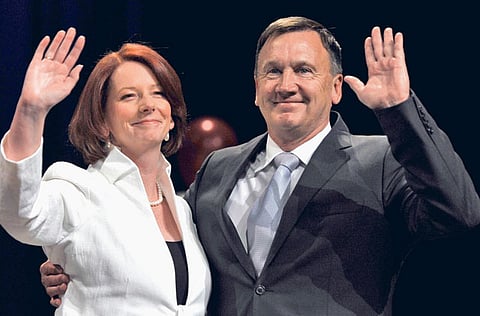Gillard says result too close to call
PM Julia Gillard says it will be days before outcome of deadlocked federal election known

Canberra: Australian Prime Minister Julia Gillard says it will be days before the outcome of Saturday’s deadlocked federal election is known.
“Obviously this (election) is too close to call, there are many seats where it’s too close to call and it will take a number of days to determine who won,” she said in a television address late last night.
Invoking a comment by former US president Bill Clinton, she said: “The Australian people have spoken, but it will take some time to understand what they have said.”
Both Gillard and her challenger Tony Abbott fell short of winning the 76 seats needed for a clear mandate and a hung Parliament is the most likely outcome, the first such instance since World War II.
Results from the National Tally Room showed that the ALP was on track to win a total of 72 seats, with Abbott’s Liberal-National Coalition taking 73.
As the new Greens MP Adam Bandt has already indicated he will support the ALP, this ties the two sides on 73 seats each. The four Independent MPs are therefore poised to be kingmakers in the coming days.
Gillard’s ALP was set to lose 15 of its 87 seats in the 150-member House of Representatives, winning only two from the Coalition.
The Coalition vastly improved its performance over the 2007 election when it was swept from power along with then prime minister, John Howard.
The Greens were the big winners, claiming a seat in the House of Representatives and the balance of power in the upper house, the Senate.
In the crucial state of Queensland, voters punished the ALP for deposing former prime minister Kevin Rudd, who hails from that state, two months ago. The Coalition picked up seven seats there from the ALP.
Both Gillard and Abbott retained their seats comfortably, as did Rudd.
One of the biggest losers was former journalist and giant-killer Maxine McKew, who had accounted for Howard in the 2007 election. She was beaten in the Sydney seat of Bennelong by former Australian tennis star John Alexander.
A surprise winner was 20-year-old Wyatt Roy of the Coalition, who was voting for the first time and will be Australia's youngest ever MP.
Labor's Mike Kelly looked set to hang on to Eden-Monaro, the bellwether seat which has traditionally gone to the party which forms the government – a trend that could end with this election.
The result was a predicted outcome to a lacklustre election campaign that never rose to any great heights, which many commentators described as a “race to the bottom” as both sides engaged in fear-mongering on asylum-seekers and immigration.
Exit polls indicated that the most important issues for voters were leadership, the budget, their local candidates, health and education.
Notably absent from the list were climate change, asylum-seekers or the controversial mining tax that brought about Rudd’s downfall.
An unexpected late twist in the tale was the addition of almost 100,000 voters to the electoral roll on the orders of the High Court of Australia just two weeks before the election.
These voters, who had missed out on registering before the deadline set by the Australian Electoral Commission, got on the roll after a successful legal challenge by political activist group Getup Australia to reverse electoral law changes introduced by the Howard government.
They are thought to have played an important role in the results, as their numbers were greater than the winning margin of votes in key battleground seats.
More than 14 million eligible voters queued up at schools and surf clubs across Australia, where voting is a rather jovial affair, with sausage rolls and cup cakes on sale outside polling booths.
The deaths of two Australian soldiers in a roadside bomb explosion in Afghanistan on Friday cast a shadow over election day.
The Australian toll in the deployment now stands at 20, but both Gillard and Abbott said on Saturday they remained committed to “staying the course” in Afghanistan.


